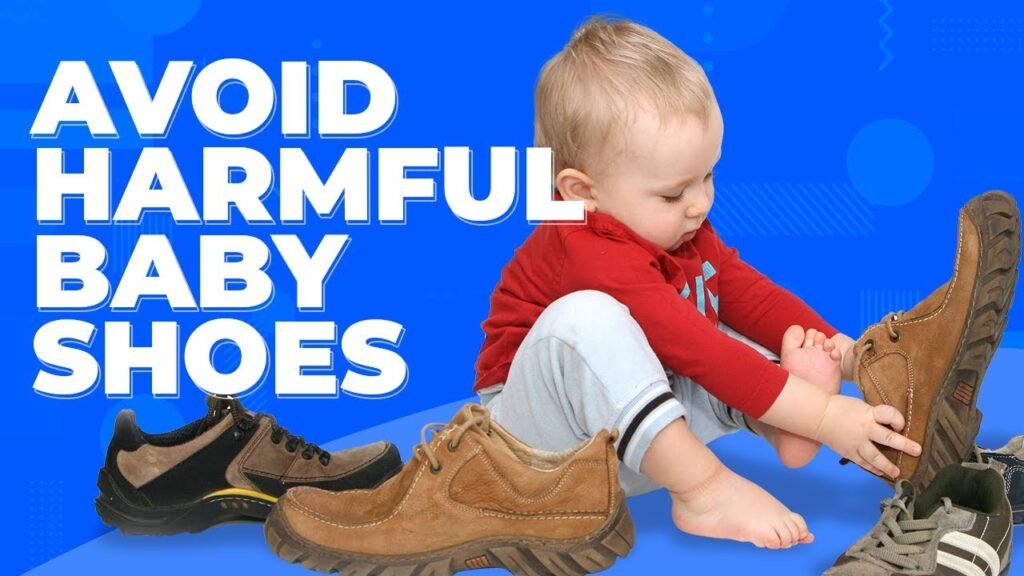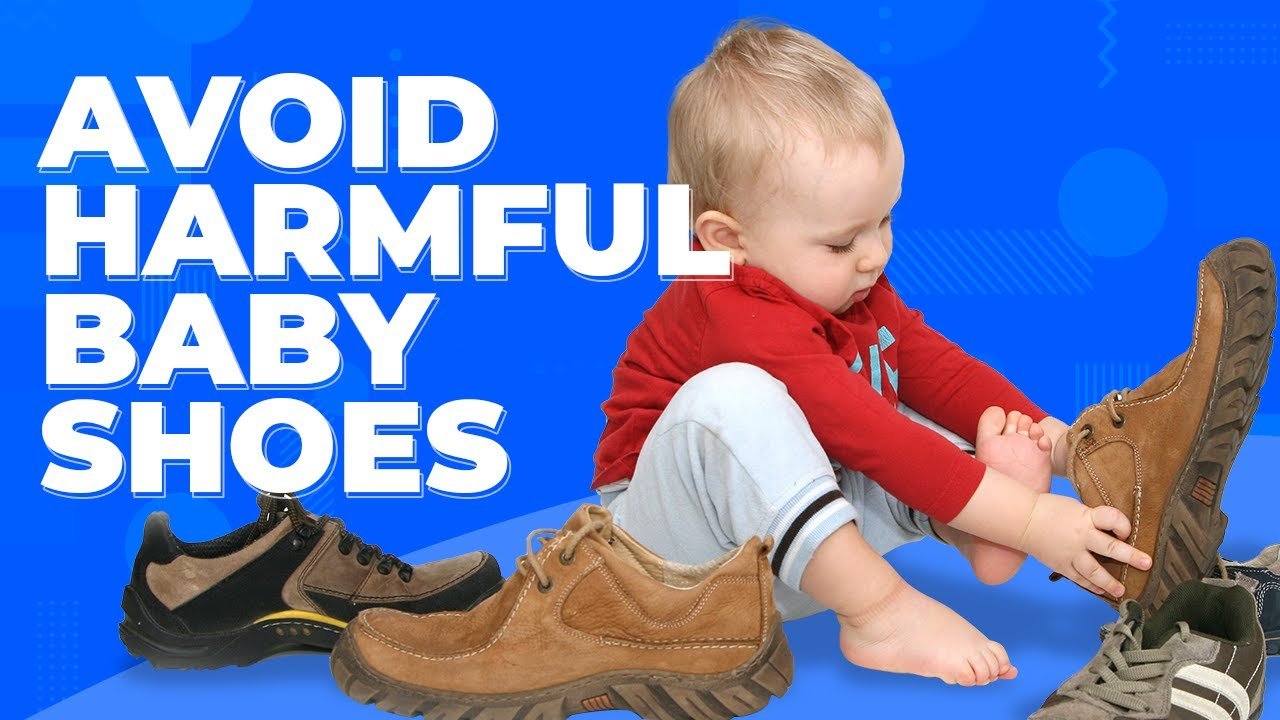When it comes to choosing the right shoes for your baby, it is crucial to consider their development. Babies do not actually need shoes until they are skilled walkers, and soft soled shoes are ideal for their tiny feet. Look for features like flexibility, wide toe area, solid heel counter, and velcro fasteners to ensure comfort and safety. Brands like Bobux Xplorers and Old Soles are recommended, and make sure the shoes fit properly to avoid any discomfort or tripping. Seeking guidance from a qualified health professional is always a good idea when it comes to your baby’s health and development.
It is essential to give your baby their first shoes at the right time and choose the best shoes to avoid any negative impacts on their gross motor development. Putting shoes on too early or choosing the wrong ones can hinder the learning process of crawling, standing, cruising, and walking. Make sure to watch the video by Emma Hubbard to understand when babies need shoes and what features to look out for in order to choose the best baby shoes. So, be sure to follow these guidelines to ensure your little one’s development is on the right track!
Importance of Choosing the Right Shoes
When it comes to your baby’s development, choosing the right shoes is crucial. The shoes your baby wears can have a significant impact on their walking skills and overall mobility. It is important to understand the role that shoes play in your baby’s development and choose accordingly.
Crucial for proper development
The right shoes can support your baby’s feet and help them develop proper balance and coordination. Shoes that are too tight or too loose can hinder their ability to walk and may even lead to discomfort or pain. By choosing the right shoes, you can ensure that your baby’s feet are properly supported and that they are able to walk and move around comfortably.
Impact on walking skills
Wearing the wrong shoes can negatively impact your baby’s walking skills. Shoes that are too rigid or too bulky can make it difficult for your baby to balance and move around freely. On the other hand, shoes that are too flexible or lack support can also lead to instability and potential injuries. Choosing the right shoes that provide the ideal balance of support and flexibility is key to helping your baby develop strong walking skills.
Appropriate Age for Baby Shoes
While it may be tempting to dress your baby in adorable shoes from day one, it is important to wait until they are skilled walkers before introducing shoes into their wardrobe. Babies do not need shoes until they are able to walk confidently on their own. Until then, allowing them to go barefoot is actually beneficial for their development.
Skilled walkers only
Before your baby is able to walk independently, it is best to let them move around barefoot. This allows them to feel the floor beneath their feet and make necessary adjustments to their balance and coordination. Once they are skilled walkers, you can consider introducing shoes to protect their feet when outdoors.
Barefoot is best for beginners
When your baby is learning to crawl, pull themselves up into standing, or cruise along furniture, going barefoot allows them to develop their natural balance and strength. It also helps strengthen the muscles and ligaments in their feet, preparing them for walking. Save the shoes for when they are ready to explore the great outdoors.

Ideal Features in Baby Shoes
When choosing shoes for your baby, there are certain features you should look out for to ensure they provide the right support and flexibility for proper development.
Soft soles for flexibility
Opt for shoes with soft soles that allow your baby’s feet to move naturally. Soft soles provide flexibility and enable your baby to feel the ground beneath their feet, aiding in balance and coordination.
Wide toe area for natural movement
Choose shoes with a wide toe area to accommodate your baby’s growing feet and allow for natural movement. This helps prevent their toes from getting squished and allows for proper development of their foot arch.
Solid heel counter for stability
Ensure that the shoes have a solid heel counter to provide stability and prevent their feet from slipping out of the shoe. A secure fit around the heel is essential for proper support and balance.
Velcro fasteners for ease
Look for shoes with velcro fasteners or other easy-to-use closures to make putting on and taking off the shoes a breeze. This ensures a snug fit and prevents their feet from sliding around in the shoes.
Types of Baby Shoes to Avoid
Not all baby shoes are created equal, and there are certain types of shoes that are best avoided to support your baby’s development.
Shoes going past the ankle
Avoid shoes that go past the ankle, as they can restrict movement and hinder the natural development of your baby’s feet and legs. Opt for shoes that provide flexibility and allow for proper range of motion.
Materials that restrict movement
Steer clear of shoes made from rigid or restrictive materials that can limit your baby’s ability to move and explore. Choose shoes that are lightweight and flexible to support their natural movement and development.
Recommended Brands for Baby Shoes
When it comes to choosing the right shoes for your baby, selecting a reputable brand that prioritizes comfort and development is key. Here are some recommended brands to consider for your little one.
Bobux Xplorers
Bobux Xplorers are known for their soft-soled shoes that provide the ideal balance of flexibility and support for your baby’s developing feet. Their shoes are designed to promote natural movement and ensure comfort for little walkers.
Old Soles
Old Soles is another brand that offers a range of shoes designed with the development of young feet in mind. Their shoes are crafted from high-quality materials and feature thoughtful designs to support proper foot development.
Brands that prioritize comfort and development
In addition to specific brands like Bobux Xplorers and Old Soles, look for shoe brands that prioritize comfort and development in their designs. Choose shoes that are lightweight, flexible, and provide the support your baby needs as they learn to walk and explore their surroundings.
Proper Fit for Baby Shoes
Ensuring that your baby’s shoes fit properly is essential for their comfort and safety. A proper fit can also prevent tripping hazards and discomfort while wearing the shoes.
Avoid tripping hazards
Shoes that are too big or too small can pose tripping hazards for your baby, especially as they are learning to walk. Make sure the shoes fit snugly but leave room for growth to prevent accidents and ensure their feet are properly supported.
Prevent discomfort and blisters
Ill-fitting shoes can lead to discomfort, blisters, and other foot issues for your baby. Check the fit of the shoes regularly and replace them as needed to ensure they are always wearing shoes that provide the right support and comfort.
Consulting Health Professionals
If you have specific health concerns or questions about your baby’s development, it is important to seek guidance from a qualified health professional. Consulting with a healthcare provider can provide valuable insights and recommendations to ensure your baby’s health and well-being.
Seeking advice for specific health concerns
If you notice any issues with your baby’s feet or development, do not hesitate to consult with a healthcare provider for guidance. They can assess the situation and provide recommendations to address any concerns and ensure proper care for your little one.
Importance of professional guidance
Health professionals have the expertise and knowledge to address health issues and provide personalized recommendations for your baby’s specific needs. Seeking professional guidance can offer peace of mind and ensure that your baby receives the best care possible.
Shopping Tips for Baby Shoes
When shopping for baby shoes, there are certain tips to keep in mind to ensure you choose the best shoes for your little one.
Measure baby’s feet accurately
Before purchasing shoes, measure your baby’s feet accurately to determine the right size. Make sure to account for growth and leave some room for their feet to grow comfortably.
Allow room for growth
Choose shoes that provide room for your baby’s feet to grow and develop. Avoid shoes that are too tight or restrictive, as they can impede proper foot development and cause discomfort.
Test shoe flexibility and fit in-store
When trying on shoes, test the flexibility and fit to ensure they provide the right support and comfort for your baby. Let your baby take a few steps in the shoes to see how they move and feel before making a final decision.
By following these tips and considerations, you can choose the best shoes for your baby that support their development and ensure their comfort and safety. Prioritize features like soft soles, wide toe areas, solid heel counters, and velcro fasteners to provide the ideal support for your little one as they learn to walk and explore the world around them. Remember to consult with health professionals if you have any concerns or questions about your baby’s development, and always prioritize their comfort and well-being when choosing shoes.

